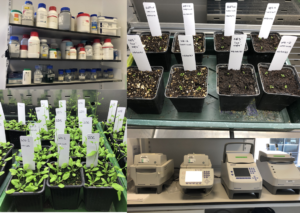Are you an interdisciplinary scientist working in biology? We want to hear from you! More details after this article.
When I first walked into my new lab, what bewildered me wasn’t the sheer amount of nondescript bottles and expensive machinery. It was the ability of my labmates to move between the -70 freezers, the centrifuges, the thermocyclers, and the gel stations and know exactly how to use each of them. As a mathematician who hadn’t ever ventured out of the library to apply my formulae to the real world, how was I supposed to keep up with everyone else?

The first hurdle in feeling like an experimentalist was learning the lingo. Little did I know that “spinning down” was not a covid-safe greeting but it was something that I’d be regularly doing to “Eppendorf tubes” over the next few years! These casual tidbits of language, alongside all the technical scientific jargon, contributed to the feeling of impostor syndrome, which is common for all PhD students. In addition, I had to try to decipher the values and unspoken rules of my new lab. Learning to never trust a open bottle or unlabelled tube was a new experience for me.
Chipping away at all these new skills was, at times, an exhausting process. However, within a few months, I started to get the feeling that I was moving past my initial uncertainty. I am glad I followed the advice to constantly ask questions, even over the smallest issues. Perhaps the hardest part of this first stage was recognising the difference between failure in biology and maths. Accidentally not feeding your plants enough sugar or contaminating a sample can feel much worse than writing a plus sign instead of a minus sign! It always helped to remember that biology is unpredictable and errors were often out of my control.
After processing this initial shock, I started to think more deeply about how my future research experience would push me in different directions to my previous projects. Biologists have a top-down view of the world. They work with complicated systems and make incremental steps towards understanding how these systems behave. As an outsider, it takes time to appreciate why biologists take so much care in reducing uncertainty in experiments.
In contrast, mathematicians will often spend years trying to answer the simplest of questions. A famous example of this is Fermat’s Last Theorem, which asks a seemingly innocent question about equations involving whole numbers. This conjecture (an unproven mathematical statement) was posed in the 17th Century and it took over 300 years for it to be proved! Although most computational biologists may not answer such theoretical questions, it can be hard to communicate the difficulties in developing a new algorithm or creating a mathematical model.

For anyone aspiring to change fields to biology, keeping your passion for your initial subject and applying this to fascinating problems is the key challenge. For mathematicians, learning that biologists talk about data and you talk about abstract structures is the solution. There are barriers to speaking this new language but the rewards of collaboration are well worth it!
Have you had a similar experience moving to biology from another subject? The DTP communications team is starting a series of blogs about interdisciplinary PhD students. Contact Ethan via twitter @EthanJRedmond or via email er1068@york.ac.uk to get involved!
